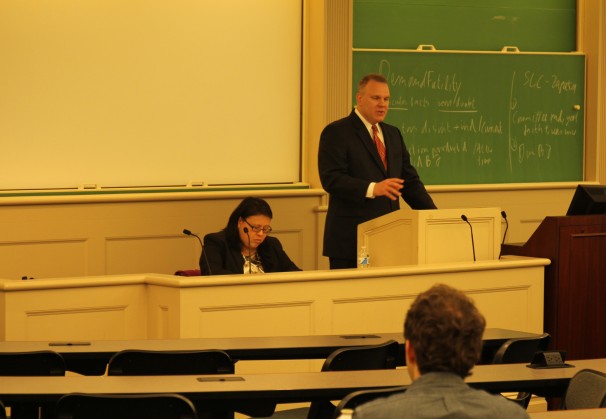
Stuart Anderson, who works for the Cato Institute, a think tank, and Brooklyn College constitutional law professor Anna Law debated immigration reform in Vanderbilt Hall on Oct 29. NYU School of Law’s Federalist Society and the American Constitutional Society co-sponsored the debate.
During the discourse chapter, which was moderated by ACS president Roman Goerss, Anderson and Law discussed their opinions about what constitutes a well-regulated immigration system and recent policy reform regarding the topic.
“Education [on immigration reform] is a long-term project,” Goerss said. “But I think a healthy dialogue between a number of different viewpoints on important and controversial subjects tends to benefit everyone.”
“The people who should get in should get in, the people who should not get in should not get in,” Law said. “How we prioritize those and achieve those goals is what conservatives and liberals disagree on. There is common ground, however, and we can be hopeful of that.”
Law discussed how the Senate Immigration Reform Bill could fix existing problems and create a pathway of citizenship for the country’s 11 million undocumented immigrants.
However, Law mentioned that before the benefits of the immigration reform bill can make an impact, the legislators who are pro-enforcement must be satisfied with border security. The bill calls for 20,000 more border patrol agents on the southwestern border of the United States.
Anderson said he wanted to see three reforms in immigration law — a more generous system of providing visas for low-skilled workers; on improvements in the visa situation for high-skilled workers; and legislation addressing illegal immigration.
Some students said the reasons legal and illegal immigrants enter the United States still have to be addressed.
“I think until we look at deeper reasons on why people are trying to come in, even when it is so dangerous and difficult, it will not change the system,” first-year law student Nina Sheth said.
Eva Yung, a first-year law student at NYU, said the path to citizenship is a complicated process that many do not understand.
“A big part of the reason why there are so many illegal immigrants is because it is hard for them to figure out how to become a legal citizen,” Yung said.
David Holmberg, member of the ACS’s New York chapter, said he would like to bring progressive thinkers together so they could be informed.
“One goal is to educate people who have enough interest but aren’t experts, and give people who are really interested [the opportunity] to get in touch with leading thinkers in the field and participate in [a] dialogue,” Holmberg said.
A version of this article appeared in the Wednesday, Oct. 30 print edition. Diana Tao is a contributing writer. Email her at [email protected].

























































































































































